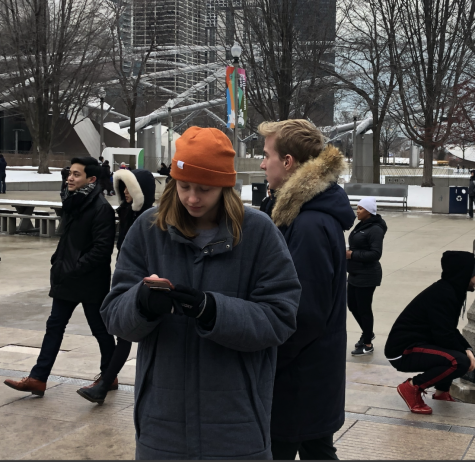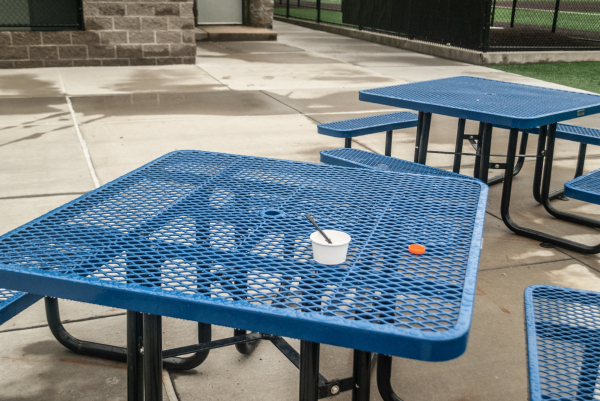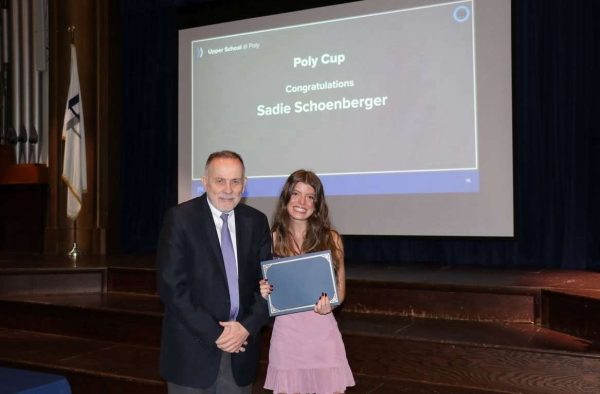A Survivor’s Story: The Holocaust Memorial Assembly
At this year’s Holocaust Memorial Assembly, Holocaust survivor Maritza Shelly spoke about her experience as a teenager in Nazi-occupied Hungary
Five days after Holocaust Remembrance Day, which marked the 75th anniversary of the liberation of Auschwitz, the Upper School gathered in the Chapel to hear from Maritza Shelley, a Jewish woman born in Budapest, Hungary, who survived the atrocities of the Holocaust nearly 80 years ago.
Shelley was introduced by junior Julia Schnipper, Jewish Caucus Vice President, who reminded the audience that “the Holocaust took the lives of an estimated six million Jews, 70,000 people with mental disabilities, approximately 10,000 members of the LGBTQ community, 200,000 people of Roma descent and about two million Polish and Yugoslavian civilians and an additional 6 million Soviet citizens.”
Shelley retold the story of her life in Hungary from the time she was placed in a working camp to when Russian soldiers liberated the city from the Nazi regime.
She began by expressing her gratitude for the opportunity to share her story.
“I’m very pleased and grateful that I can be here to talk to you, particularly now because there has been such an upsurge in anti-Semitism in this country, which scares me. From painting swastikas on buildings to the killing of worshipers in a synagogue, it is something that we can’t accept; we have to fight and we have to talk about it,” she said.
She emphasized the importance of sharing her experiences, especially because of the existence of Holocaust deniers.
Shelley said, “The second thing is that unfortunately we survivors and witnesses to the Holocaust are vanishing and soon there will be none of us to tell the story. There are a lot of people who deny the existence of the Holocaust and the upsurge of anti-Semitism; there will be more people who can say the Holocaust is just Jewish propaganda, so I want to talk about my experience so you can say, ‘I know someone who had survived the Holocaust.’ It will be up to you.”
After the German occupation of Hungary on March 19, 1944, her father was deported and she and her sister were sent to a slave labor camp based in an abandoned brick factory. Working in horrible conditions, the women were forced to dig ditches, which ultimately proved futile, in an attempt to keep the approaching Russian army out of Budapest. Shelley also explained how, by chance, she came very close to escaping death at the camp.
“One day, I felt very sick and I thought maybe I should stay back. I didn’t know if I could manage to carry the shovel, but then I didn’t want to be separated from my sister. So I did go. When we came back, we saw several sticks sticking up with clothes on it, women’s clothes, and it turned out that those who didn’t go to work that day were made to dig their graves, get undressed, and they were shot in their graves, and so I made the right decision. So much of life depends on chance.”
After several months, when it was decided that all Jews should be deported out of Hungary and into concentration camps, she was sent home to her mother by herself and forced to march for days towards the Austrian border. On the march, she was reunited with her sister, and it was here that she managed to escape from Nazi control by jumping off the highway and into a dried river bed.
On their way back home to Budapest, Shelley, her mother, and her sister twice came face to face with Nazis and twice escaped. They even encountered a ten-year-old Hungarian girl who, thinking they were Hungarian, bragged “that she discovered some Jews who were hiding and she turned them in and that they were gone and she was very proud to have done that.”
After hitchhiking with a group of German officers and convincing a Hungarian soldier to smuggle them aboard a train, they returned to find the city under siege by the Russian Army. The Shelleys managed to survive in the city with the help of several friends and false papers their father had made until “one day, the door of the cellar opened and there was a Russian soldier. And we knew that we survived because the Russians took over, and although life was not easy afterward, as Jews, we were saved. Our life was saved. So, that’s the story.”
Shelley concluded by telling the audience that “I was scared mostly all the time, of course, but the moment we decided to escape, I stopped being afraid…I had, what we call, agency….And that gave us the courage and I think that’s something to remember and think about: nothing is scarier than being at the mercy of someone else. And the other thing is [to] hold onto your identity… you are you.”
She then answered several audience questions, and Schnipper said a few closing remarks. After the Assembly, junior Charlotte Knutsen said, “It made the issue more real to actually see with your own eyes someone who lived through it and who lived through such a dramatic story.”

Tessa Marker '21 has been a staff writer for the Polygon since her freshman year and has enjoyed taking on more responsibility as a News Editor last year...




























